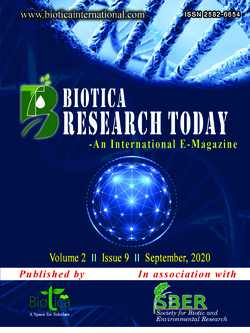
Some Major Problematic Soils and Their Management
Kumar Chiranjeeb*
Dept. of Soil Science and Agricultural Chemistry, GIET University, School of Agriculture, Gunupur, Rayagada, Odisha (765022), India
Vivek Kumar
Dept. of Soil Science, Dr. Rajendra Prasad Central Agricultural University, Pusa, Samastipur, Bihar (848 125), India
Priyanka Kumari
Dept. of Soil Science and Agricultural Chemistry, Bihar Agricultural University, Sabour, Bhagalpur, Bihar (813 210), India
Abhisek Pal
Dept. of Soil Science and Agricultural Chemistry, GIET University, School of Agriculture, Gunupur, Rayagada, Odisha (765022), India
DOI: NIL
Keywords: ESP, pH, Problematic Soils, SAR
Abstract
A soil provides nutrients and other essential requirements for normal plant growth. A fertile soil with no major constraints can give maximum output. Problematic soils (saline soils, sodic soil, acid and acid sulphate soil, saline sodic soil, etc.) are different from normal soils with certain limitations for plant growth. Excess salinity level, Sodium content that leads to deflocculation and high acidity level all these are harmful for normal plant growth. Correction methods such as scrapping, leaching, profile inversion, organic matter applications, liming, gypsum, etc. are applied in case of these soils along with suitable cropping systems are necessary.
Downloads
not found
Reference
Sathyanarayana, E. and Kumar, M.S., 2018. Soil science treatise (1st ed.). India, Jaya Publications.
Liu, X., Mao,R., Bai, P. and Luo, C. 2002. Reclaiming the saline soils of Nanpi County: turning knowledge into practice. In: McVicar, T.R., Li Rui, Walker, J., Fitzpatrick, R.W. and Liu Changming (eds), Regional Water and Soil Assessment for Managing Sustainable Agriculture in China and Australia, ACIAR Monograph No. 84, 366–370.
